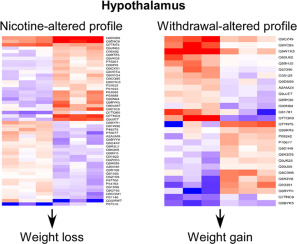当前位置:
X-MOL 学术
›
J. Proteomics
›
论文详情
Our official English website, www.x-mol.net, welcomes your
feedback! (Note: you will need to create a separate account there.)
Hypothalamic proteome changes in response to nicotine and its withdrawal are potentially associated with alteration in body weight.
Journal of Proteomics ( IF 2.8 ) Pub Date : 2020-01-03 , DOI: 10.1016/j.jprot.2020.103633 Mei-Mei Gao 1 , Fei Hu 1 , Xiang-Da Zeng 1 , Hui-Ling Tang 1 , Huan Zhang 1 , Wei Jiang 1 , Hua-Juan Yan 1 , Hang Shi 1 , Yousheng Shu 2 , Yue-Sheng Long 1
Journal of Proteomics ( IF 2.8 ) Pub Date : 2020-01-03 , DOI: 10.1016/j.jprot.2020.103633 Mei-Mei Gao 1 , Fei Hu 1 , Xiang-Da Zeng 1 , Hui-Ling Tang 1 , Huan Zhang 1 , Wei Jiang 1 , Hua-Juan Yan 1 , Hang Shi 1 , Yousheng Shu 2 , Yue-Sheng Long 1
Affiliation

|
Nicotine, a major addictive component in tobacco, plays an important role in the changes of body weight upon smoking and its cessation. Here we showed that nicotine-treated mice exhibited weight loss and nicotine withdrawal led to weight gain. Using TMT-based proteomic analysis, we obtained the different hypothalamic protein profiles in response to nicotine and its withdrawal. A total of ~5000 proteins were identified from the hypothalamus with 50 altered proteins upon 28-day nicotine treatment and 28 altered proteins upon 15-day nicotine withdrawal. Of the altered proteins, CASP3, LCMT2, GRIN2D, CCNT2, FADS3 and MRPS18B were inversely changed in response to nicotine and withdrawal, coincidence with the change of body weight. Of them, CASP3, LCMT2, GRIN2D and CCNT2 were found to be associated with several GO terms and KEGG pathways linking with cell apoptosis, neurotransmission and metabolism. Further Western blot and RT-qPCR analyses confirmed that the levels of the 4 proteins CASP3, LCMT2, GRIN2D and CCNT2, instead of their mRNA transcripts, altered in response to nicotine and withdrawal. Thus this study provides nicotine- and withdrawal-induced hypothalamic protein profiles and suggests potential roles of these altered proteins in the change of body weight. SIGNIFICANCE: Cigarette smoking is one of important factors harming human health. Most smokers tend to have lower body weights and smoking cessation often lead to overweight or obesity, which is an important reason for smokers to insist on smoking. It is known that nicotine, a critical component in tobacco, is associated with the alteration in body weight by affecting hypothalamic function. Through TMT-based proteomic analysis, this study identified differential hypothalamic protein profiles in response to nicotine treatment and its withdrawal, and 4 nicotine- and withdrawal-induced contrary proteins CASP3, LCMT2, GRIN2D and CCNT2 are involved in several enriched GO terms and KEGG pathways, which are associated with cell apoptosis, neurotransmission and metabolism. Our study may provide novel targets for further investigation of the molecular mechanisms of nicotine- and withdrawal-induced alteration in body weight.
中文翻译:

下丘脑蛋白质组对尼古丁的反应及其戒断可能与体重改变有关。
烟碱是烟草的主要成瘾成分,在吸烟和戒烟后体重变化中起着重要作用。在这里,我们显示尼古丁治疗的小鼠表现出体重减轻,尼古丁戒断导致体重增加。使用基于TMT的蛋白质组学分析,我们获得了响应于尼古丁及其戒断的不同下丘脑蛋白质概况。尼古丁治疗28天后,从下丘脑中总共鉴定出约5000种蛋白质,其中50种改变了蛋白质,尼古丁戒断15天则发现了28种改变了蛋白质。在改变的蛋白质中,CASP3,LCMT2,GRIN2D,CCNT2,FADS3和MRPS18B响应于尼古丁和戒断而发生逆向变化,与体重变化相吻合。其中,CASP3,LCMT2,发现GRIN2D和CCNT2与几个GO术语和KEGG通路相关,这些通路与细胞凋亡,神经传递和代谢有关。进一步的Western印迹和RT-qPCR分析证实,响应于尼古丁和戒断,这4种蛋白CASP3,LCMT2,GRIN2D和CCNT2的水平而不是其mRNA转录水平发生了变化。因此,这项研究提供了尼古丁和戒断引起的下丘脑蛋白质分布,并暗示了这些改变的蛋白质在体重变化中的潜在作用。意义:吸烟是危害人类健康的重要因素之一。大多数吸烟者体重较轻,戒烟通常会导致超重或肥胖,这是吸烟者坚持吸烟的重要原因。众所周知,尼古丁是烟草中的关键成分,通过影响下丘脑功能与体重改变有关。通过基于TMT的蛋白质组学分析,该研究确定了响应于尼古丁治疗及其戒断的下丘脑差异蛋白质谱,并且有4种尼古丁和戒断诱导的相反蛋白质CASP3,LCMT2,GRIN2D和CCNT2参与了一些丰富的GO术语和KEGG途径与细胞凋亡,神经传递和代谢有关。我们的研究可能为进一步研究烟碱和戒断所致体重改变的分子机制提供新的靶标。和4种尼古丁和戒断诱导的相反蛋白CASP3,LCMT2,GRIN2D和CCNT2参与了几个丰富的GO术语和KEGG通路,这些通路与细胞凋亡,神经传递和代谢有关。我们的研究可能为进一步研究烟碱和戒断所致体重改变的分子机制提供新的靶标。和4种尼古丁和戒断诱导的相反蛋白CASP3,LCMT2,GRIN2D和CCNT2参与了几个丰富的GO术语和KEGG通路,这些通路与细胞凋亡,神经传递和代谢有关。我们的研究可能为进一步研究烟碱和戒断所致体重改变的分子机制提供新的靶标。
更新日期:2020-01-04
中文翻译:

下丘脑蛋白质组对尼古丁的反应及其戒断可能与体重改变有关。
烟碱是烟草的主要成瘾成分,在吸烟和戒烟后体重变化中起着重要作用。在这里,我们显示尼古丁治疗的小鼠表现出体重减轻,尼古丁戒断导致体重增加。使用基于TMT的蛋白质组学分析,我们获得了响应于尼古丁及其戒断的不同下丘脑蛋白质概况。尼古丁治疗28天后,从下丘脑中总共鉴定出约5000种蛋白质,其中50种改变了蛋白质,尼古丁戒断15天则发现了28种改变了蛋白质。在改变的蛋白质中,CASP3,LCMT2,GRIN2D,CCNT2,FADS3和MRPS18B响应于尼古丁和戒断而发生逆向变化,与体重变化相吻合。其中,CASP3,LCMT2,发现GRIN2D和CCNT2与几个GO术语和KEGG通路相关,这些通路与细胞凋亡,神经传递和代谢有关。进一步的Western印迹和RT-qPCR分析证实,响应于尼古丁和戒断,这4种蛋白CASP3,LCMT2,GRIN2D和CCNT2的水平而不是其mRNA转录水平发生了变化。因此,这项研究提供了尼古丁和戒断引起的下丘脑蛋白质分布,并暗示了这些改变的蛋白质在体重变化中的潜在作用。意义:吸烟是危害人类健康的重要因素之一。大多数吸烟者体重较轻,戒烟通常会导致超重或肥胖,这是吸烟者坚持吸烟的重要原因。众所周知,尼古丁是烟草中的关键成分,通过影响下丘脑功能与体重改变有关。通过基于TMT的蛋白质组学分析,该研究确定了响应于尼古丁治疗及其戒断的下丘脑差异蛋白质谱,并且有4种尼古丁和戒断诱导的相反蛋白质CASP3,LCMT2,GRIN2D和CCNT2参与了一些丰富的GO术语和KEGG途径与细胞凋亡,神经传递和代谢有关。我们的研究可能为进一步研究烟碱和戒断所致体重改变的分子机制提供新的靶标。和4种尼古丁和戒断诱导的相反蛋白CASP3,LCMT2,GRIN2D和CCNT2参与了几个丰富的GO术语和KEGG通路,这些通路与细胞凋亡,神经传递和代谢有关。我们的研究可能为进一步研究烟碱和戒断所致体重改变的分子机制提供新的靶标。和4种尼古丁和戒断诱导的相反蛋白CASP3,LCMT2,GRIN2D和CCNT2参与了几个丰富的GO术语和KEGG通路,这些通路与细胞凋亡,神经传递和代谢有关。我们的研究可能为进一步研究烟碱和戒断所致体重改变的分子机制提供新的靶标。











































 京公网安备 11010802027423号
京公网安备 11010802027423号